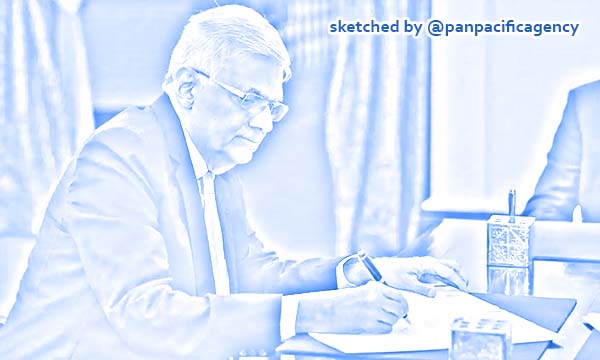Sri Lanka’s new PM warns ‘most difficult months of our lives’ ahead

Ranil Wickremesinghe at his swearing-in ceremony at the presidential palace in Colombo on Thursday last week. Photograph: Sri Lanka President's Office/AFP/Getty. Sketched by the Pan Pacific Agency. Images.
COLOMBO, May 17, 2022, The Guardian. Sri Lanka’s new prime minister, Ranil Wickremesinghe, has warned that the financial crisis engulfing the country will get worse and “the next couple of months will be the most difficult ones of our lives”, The Guardian reported.
In his first address to the country since he was appointed as interim prime minister on Thursday, after Mahinda Rajapaksa stepped down from the role amid Sri Lanka’s worst economic crash since independence, Wickremesinghe was blunt as he described the conditions of the country’s finances as “extremely precarious”.
“In November 2019, our foreign exchange reserves were at $7.5bn. However, today, it is a challenge for the Treasury to find $1m,” he said.
Wickremesinghe said the country had “run out of petrol … At the moment, we only have petrol stocks for a single day.” He warned that the power outages, which have already lasted up to eight hours a day, were likely to worsen in the next two months.
While there are ships carrying fuel in the harbour of the capital city, Colombo, the prime minister admitted that the government could not currently afford to pay for them, even as people queued in desperation for hours outside petrol stations.
“We must prepare ourselves to make some sacrifices and face the challenges of this period” said Wickremesinghe.
His speech was the most upfront given by a ruling figure about the financial disaster gripping Sri Lanka, which has spiralled from an economic crisis into a mounting political crisis. With the country’s foreign reserves shrinking to almost nothing, and its foreign debt totalling more than $51bn (£42bn), Sri Lanka is on the verge of bankruptcy. It has been unable to import fuel, food and medicines, leading to dangerous shortages, and has temporarily defaulted on its foreign loans. Wickremesinghe confirmed in Monday’s speech that supplies of 14 critical medicines on the island were running out.
The financial crisis has led to a mass protest movement against the president, Gotabaya Rajapaksa, and other members of his powerful ruling family who have been held responsible for catastrophic economic mismanagement. While Mahinda Rajapaksa, the president’s older brother, resigned as prime minister last week, Gotabaya Rajapaksa has continued to refuse to bow to the demands of the majority of the electorate and has held on to power.
It was Gotabaya Rajapaksa who appointed Wickremesinghe as the interim prime minister last week with the task of overseeing a cross-party government to help steer the country out of the crisis and secure emergency bailouts from international organisations. While Wickremesinghe, who has been prime minister five times before, belongs to a party in opposition to the Rajapaksas, he is also seen as close to the family as well as being a steady pair of hands for the economy.
His appointment angered many protesters who view him as part of the old political establishment and he was accused of propping up the Rajapaksa family by taking on the position.
However, Wickremesinghe has insisted he supports the buoyant protest movement and over the weekend set up a committee to look after the protest camp they have set up in Colombo.
In his speech, Wickremesinghe also admitted he would have to temporarily continue with some problematic economic policies. “Against my own wishes, I am compelled to permit printing money in order to pay state-sector employees and to pay for essential goods and services,” he said.
On Monday, Sri Lanka’s main opposition party said they would offer support for Wickremesinghe’s new government in any progressive policies they put forward, but would refuse to hold any seats in the cabinet until Gotabaya Rajapaksa agreed to step down.